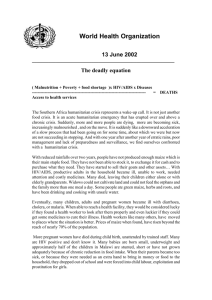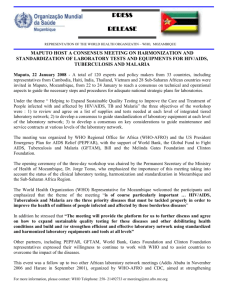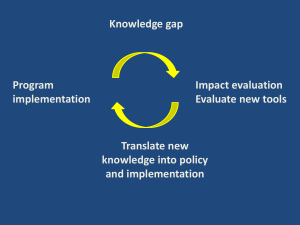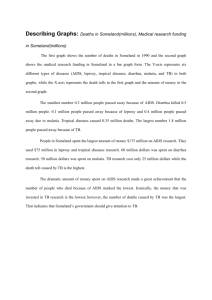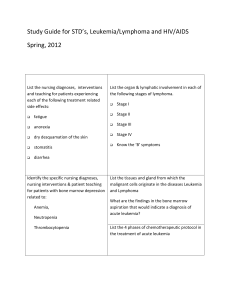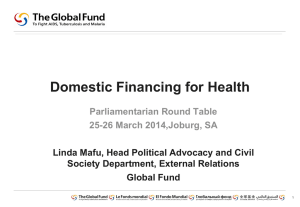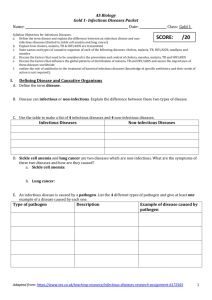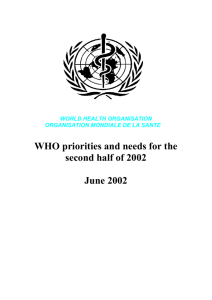What support will the UK provide? - Department for International
advertisement
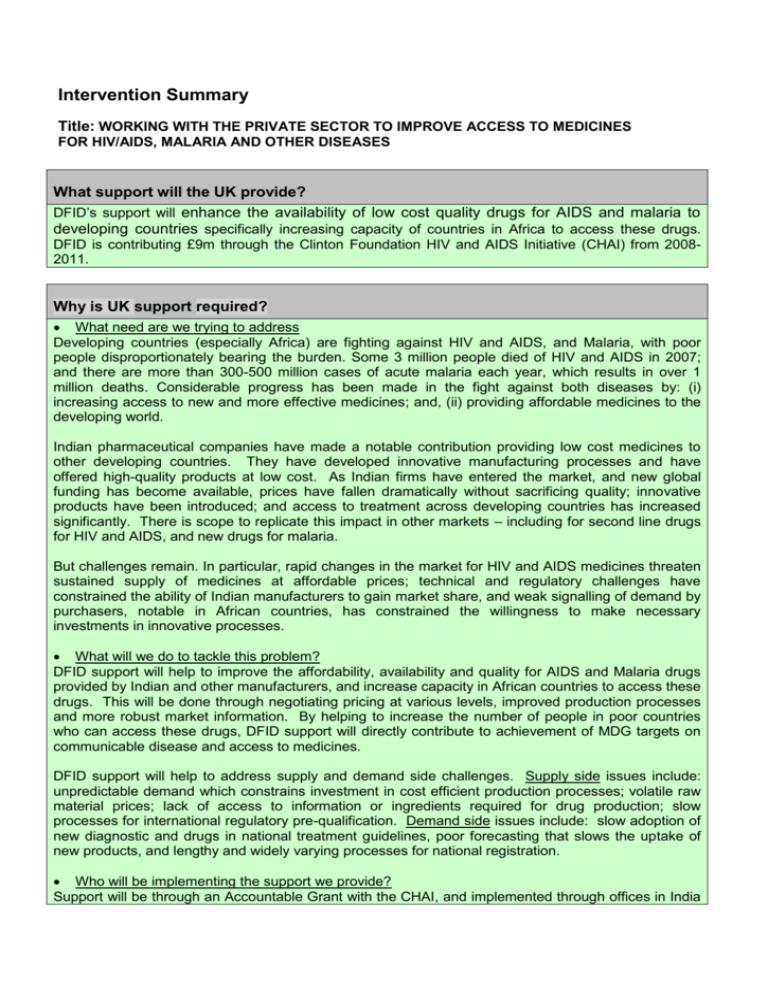
Intervention Summary Title: WORKING WITH THE PRIVATE SECTOR TO IMPROVE ACCESS TO MEDICINES FOR HIV/AIDS, MALARIA AND OTHER DISEASES What support will the UK provide? DFID’s support will enhance the availability of low cost quality drugs for AIDS and malaria to developing countries specifically increasing capacity of countries in Africa to access these drugs. DFID is contributing £9m through the Clinton Foundation HIV and AIDS Initiative (CHAI) from 20082011. Why is UK support required? What need are we trying to address Developing countries (especially Africa) are fighting against HIV and AIDS, and Malaria, with poor people disproportionately bearing the burden. Some 3 million people died of HIV and AIDS in 2007; and there are more than 300-500 million cases of acute malaria each year, which results in over 1 million deaths. Considerable progress has been made in the fight against both diseases by: (i) increasing access to new and more effective medicines; and, (ii) providing affordable medicines to the developing world. Indian pharmaceutical companies have made a notable contribution providing low cost medicines to other developing countries. They have developed innovative manufacturing processes and have offered high-quality products at low cost. As Indian firms have entered the market, and new global funding has become available, prices have fallen dramatically without sacrificing quality; innovative products have been introduced; and access to treatment across developing countries has increased significantly. There is scope to replicate this impact in other markets – including for second line drugs for HIV and AIDS, and new drugs for malaria. But challenges remain. In particular, rapid changes in the market for HIV and AIDS medicines threaten sustained supply of medicines at affordable prices; technical and regulatory challenges have constrained the ability of Indian manufacturers to gain market share, and weak signalling of demand by purchasers, notable in African countries, has constrained the willingness to make necessary investments in innovative processes. What will we do to tackle this problem? DFID support will help to improve the affordability, availability and quality for AIDS and Malaria drugs provided by Indian and other manufacturers, and increase capacity in African countries to access these drugs. This will be done through negotiating pricing at various levels, improved production processes and more robust market information. By helping to increase the number of people in poor countries who can access these drugs, DFID support will directly contribute to achievement of MDG targets on communicable disease and access to medicines. DFID support will help to address supply and demand side challenges. Supply side issues include: unpredictable demand which constrains investment in cost efficient production processes; volatile raw material prices; lack of access to information or ingredients required for drug production; slow processes for international regulatory pre-qualification. Demand side issues include: slow adoption of new diagnostic and drugs in national treatment guidelines, poor forecasting that slows the uptake of new products, and lengthy and widely varying processes for national registration. Who will be implementing the support we provide? Support will be through an Accountable Grant with the CHAI, and implemented through offices in India and the US. CHAI in turn has Memorandum of Understanding with over 70 countries reflecting its longterm commitment to collaborate on the expansion of care and treatment of HIV and AIDS and Malaria and now expanding to other diseases. CHAI has the breadth of links with drug manufacturers, manufacturers of pharmaceutical ingredients and other private sector partners whilst other agencies (such as World Health Organisation, Global Fund) have expertise in technical support to country governments. What are the expected results? What will change as a result of our support On the supply side, the project will identify opportunities for efficiency savings and improved processes. On the demand side, the project will seek to improve predictability for key commodities. Although the project will work primarily with Indian suppliers, the benefits – such as improved technical processes for producing pharmaceutical ingredients and improved knowledge of demand for drugs – will not be limited to Indian manufacturers. Key Purpose level targets are: a) HIV and AIDS: Reduction of US $100 million in total spending on drugs by low and middle income countries (compared to no intervention); b) Malaria: Global sales volumes of malaria drugs are over 190 million treatments by end of project (from a baseline of 110m, 2008). What are the planned Outputs attributable to UK support? i) ii) iii) iv) v) Expanded access to high-quality, low-cost drugs and Rapid Diagnostic Tests for malaria diagnosis and treatment; Improved access to ‘next-generation’ first-line and second-line drugs for HIV; Market assessments for other neglected diseases conducted; Improved capacity in focus countries to access low cost quality drugs for HIV and malaria, particularly through more accurate demand forecasting Lessons shared on innovative engagement with private sector, both internally and externally How will we determine whether the expected results have been achieved? Robust monitoring systems are in place to determine the achievement of expected results.
